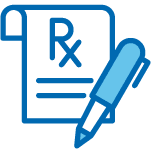Nuclear medicine is a medical imaging procedure that uses small amounts of radioactive materials, known as radiopharmaceuticals or radioactive tracers, to diagnose and treat a variety of medical conditions. While other imaging techniques, such as X-rays or CT scans, primarily show what structures inside the body look like, nuclear medicine can assess how well organs and tissues are functioning.
Conditions commonly diagnosed and managed with nuclear medicine include:
- Bone disorders, such as arthritis
- Cancers, including breast, lung, bone and thyroid cancers
- Endocrine disorders
- Gastrointestinal disorders like gastroesophageal reflux disease (GERD)
- Heart issues, such as coronary artery disease, heart muscle damage and heart valve disorders
- Infections and inflammation
- Kidney stones or infections
- Lung disorders, such as pulmonary embolism
- Neurological disorders like Alzheimer’s disease and epilepsy
- Autoimmune diseases, such as rheumatoid arthritis
- Thyroid disorders
What to expect
When you arrive for your scan, our nuclear medicine technologist will ask you a series of questions about your medical history and any medications you are taking. Please let them know if you’re breastfeeding or think you may be pregnant. Next, the technologist will inject a radioactive tracer into your vein. In some cases, the tracer may also be given orally. The level of radiation released by the tracer is low. The only side effect may be soreness or swelling at the injection site, which tends to be a rare occurrence.
During the scan, you lie on a padded table. As the radioactive tracer moves through your body, a camera takes a series of images. You will need to lie still while these pictures are taken.
The length of a nuclear medicine scan varies. Some scans take less than an hour, while others may require more time or multiple visits. We recommend bringing reading material with you, as it can take time for the radioactive tracer to circulate through your body. Our nuclear medicine technologists will guide you through the entire process and answer any questions you have before the exam begins.
How to prepare
- Follow instructions for your appointment. When you make your appointment, our care team will explain your particular procedure and provide detailed instructions. You may be asked to limit food and fluids before the test. Do not smoke or consume caffeine for four to six hours before the test. (For those undergoing a cardiac study, you may need to abstain from caffeine for 24 hours beforehand.)
- Wear comfortable clothing. Please avoid wearing clothing with metal buttons or zippers. You will need to remove any jewelry that might interfere with the scan.
- Arrange child care and transportation. For the safety of you and your children, please do not bring them to your appointment. If you are unable to arrange child care, please reschedule your appointment.
After your exam
Once the exam is finished, you may resume your regular diet. Drink a lot of water after the scan to help flush the tracer out of your body.
A radiologist, a physician who specializes in interpreting medical imaging, will analyze the results and send a report to your health care provider. You can also view your results in MyChart once they are available.

How to refer a patient
Please visit our Refer a Patient page for instructions on how to refer patients for medical imaging services.